- Home
- Mordecai Richler
The Street
The Street Read online
The Author
MORDECAI RICHLER was born in Montreal, Quebec, in 1931. Raised there in the working-class Jewish neighbourhood around St. Urbain Street, he attended Sir George Williams College (now a part of Concordia University). In 1951 he left Canada for Europe, settling in London, England, in 1954. Eighteen years later, he moved back to Montreal.
Novelist and journalist, screenwriter and editor, Richler, one of our most acclaimed writers, spent much of his career chronicling, celebrating, and criticizing the Montreal and the Canada of his youth. Whether the settings of his fiction are St. Urbain Street or European capitals, his major characters never forsake the Montreal world that shaped them. His most frequent voice is that of the satirist, rendering an honest account of his times with care and humour.
Richler’s many honours included the Giller Prize, two Governor General’s Awards, and innumerable other awards for fiction, journalism, and screenwriting.
Mordecai Richler died in Montreal in 2001.
THE NEW CANADIAN LIBRARY
General Editor: David Staines
ADVISORY BOARD
Alice Munro
W.H. New
Guy Vanderhaeghe
Copyright © 1969 by Mordecai Richler
Copyright © 2002 by Mordecai Richler Productions, Inc.
Afterword copyright © 2002 by William Weintraub
This book was first published in Canada by McClelland & Stewart in 1969
New Canadian Library edition 2002
All rights reserved. The use of any part of this publication reproduced, transmitted in any form or by any means, electronic, mechanical, photocopying, recording, or otherwise, or stored in a retrieval system, without the prior written consent of the publisher – or, in case of photocopying or other reprographic copying, a licence from the Canadian Copyright Licensing Agency – is an infringement of the copyright law.
LIBRARY AND ARCHIVES CANADA CATALOGUING IN PUBLICATION
Richler, Mordecai, 1931-2001
The street
(New Canadian library)
eISBN: 978-1-55199-566-3
1. Richler, Mordecai, 1931-2001 – Childhood and youth.
I. Title. II. Series.
PS8535.I38S87 2002 C813’.54 c2001-903556-x
PR9199.3.R5S87 2002
We acknowledge the financial support of the Government of Canada through the Book Publishing Industry Development Program and that of the Government of Ontario through the Ontario Media Development Corporation’s Ontario Book Initiative. We further acknowledge the support of the Canada Council for the Arts and the Ontario Arts Council for our publishing program.
McClelland & Stewart Ltd.
75 Sherbourne Street
Toronto, Ontario
M5A 2P9
www.mcclelland.com/NCL
v3.1
The following dedication appeared in the original edition:
For
DANIEL
NOAH
EMMA
MARTHA
and
JACOB
Contents
Cover
About the Author
Title Page
Copyright
Dedication
Foreword: Going Home Again
1 The Street
2 The Summer My Grandmother Was Supposed to Die
3 The Red Menace
4 The Main
5 Pinky’s Squealer
6 Bambinger
7 Benny, the War in Europe, and Myerson’s Daughter Bella
8 Making It with the Chicks
9 Some Grist for Mervyn’s Mill
10 The War, Chaverim, and After
Afterword
Other Books by This Author
FOREWORD
Going Home Again
“WHY DO YOU want to go to university?” the student counsellor asked me.
Without thinking, I replied, “I’m going to be a doctor, I suppose.”
A doctor.
One St. Urbain Street day cribs and diapers were cruelly withdrawn and the next we were scrubbed and carted off to kindergarten. Though we didn’t know it, we were already in pre-med school. School starting age was six, but fiercely competitive mothers would drag protesting four-year-olds to the registration desk and say, “He’s short for his age.”
“Birth certificate, please?”
“Lost in a fire.”
On St. Urbain Street, a head start was all. Our mothers read us stories from Life about pimply astigmatic fourteen-year-olds who had already graduated from Harvard or who were confounding the professors at M.I.T. Reading Tip-Top Comics or listening to The Green Hornet on the radio was as good as asking for a whack on the head, sometimes administered with a rolled-up copy of The Canadian Jewish Eagle, as if that in itself would be nourishing. We were not supposed to memorise baseball batting averages or dirty limericks. We were expected to improve our Word Power with the Reader’s Digest and find inspiration in Paul de Kruif’s medical biographies. If we didn’t make doctors, we were supposed to at least squeeze into dentistry. School marks didn’t count as much as rank. One wintry day I came home, nostrils clinging together and ears burning cold, proud of my report. “I came rank two, Maw.”
“And who came rank one, may I ask?”
Mrs. Klinger’s boy, alas. Already the phone was ringing. “Yes, yes,” my mother said to Mrs. Klinger, “congratulations, and what does the eye doctor say about your Riva, poor kid, to have a complex at her age, will they be able to straighten them …”
Parochial school was a mixed pleasure. The old, underpaid men who taught us Hebrew tended to be surly, impatient. Ear-twisters and knuckle-rappers. They didn’t like children. But the girls who handled the English-language part of our studies were charming, bracingly modern and concerned about our future. They told us about El Campesino, how John Steinbeck wrote the truth, and read Sacco’s speech to the court aloud to us. If one of the younger, unmarried teachers started out the morning looking weary we assured each other that she had done it the night before. Maybe with a soldier. Bareback.
From parochial school, I went on to a place I call Fletcher’s Field High in the stories and memoirs that follow. Fletcher’s Field High was under the jurisdiction of the Montreal Protestant School Board, but had a student body that was nevertheless almost a hundred per cent Jewish. The school became something of a legend in our area. Everybody, it seemed, had passed through FFHS. Canada’s most famous gambler. An atom bomb spy. Boys who went off to fight in the Spanish Civil War. Miracle-making doctors and silver-tongued lawyers. Boxers. Fighters for Israel. All of whom were instructed, as I was, to be staunch and bold, to play the man, and, above all, to
Strive hard and work
With your heart in the doing.
Up play the game,
As you learnt it at Fletcher’s.
Again and again we led Quebec province in the junior matriculation results. This was galling to the communists amongst us who held we were the same as everyone else, but to the many more who knew that for all seasons there was nothing like a Yiddish boy, it was an annual cause for celebration. Our class at F.F.H.S., Room 41, was one of the few to boast a true Gentile, an authentic white Protestant. Yugoslavs and Bulgarians, who were as foxy as we were, their potato-filled mothers sitting just as rigid in their corsets at school concerts, fathers equally prone to natty straw hats and cursing in the mother-tongue, did not count. Our very own WASP’S name was Whelan, and he was no less than perfect. Actually blond, with real blue eyes, and a tendency to sit with his mouth hanging open. A natural hockey player, a born first-baseman. Envious students came from other classrooms to look him over and put questions to him. Whelan, as was to be expected, was not excessively bright, but he gave Room 41 a certain tone, some badly needed
glamour, and in order to keep him with us as we progressed from grade to grade, we wrote essays for him and slipped him answers at examination time. We were enormously proud of Whelan.
Among our young school masters, most of them returned war veterans, there were a number of truly dedicated men as well as some sour and brutish ones, like Shaw, who strapped twelve of us one afternoon, ten on each hand, because we wouldn’t say who had farted while his back was turned. The foibles of older teachers were well-known to us, because so many aunts, uncles, cousins and elder brothers had preceded us at F.F.H.S. There was, for instance, one master who initiated first year students with a standing joke. “Do you know how the Jews make an ‘s’?”
“No, Sir.”
Then he would make an ‘s’ on the blackboard and draw two strokes through it. The dollar sign.
Among us, at F.F.H.S., were future leaders of the community. Progressive parents. Reform-minded aldermen. Anti-fallout enthusiasts. Collectors of early French Canadian furniture. Boys who would actually grow up to be doctors and lecture on early cancer warnings to ladies’ clubs. Girls who would appear in the social pages of the Montreal Star, sponsoring concerts in aid of retarded children (regardless of race, colour, or creed) and luncheon hour fashion shows, proceeds to the Hebrew University. Lawyers. Notaries. Professors. And marvellously with-it rabbis, who could not only quote Rabbi Akiba but could also get a kick out of a hockey game. But at the time who would have known that such slouchy, aggressive girls, their very brassieres filled with bluff, would grow up to look so serene, such honeys, seeking apotheosis at the Saidye Bronfman Cultural Centre, posing on curving marble stairwells in their bouffant hair styles and strapless gowns? Or that such nervy boys, each one a hustler, would mature into men who were so damn pleased with what this world has to offer, epiphanous, radiating self-confidence at the curling or country club, at ease even with pot-bellies spilling over their Bermuda shorts? Who would have guessed?
Not me.
Looking back on those raw formative years at F.F.H.S., I must say we were not a promising or engaging bunch. We were scruffy and spiteful, with an eye on the main chance. So I can forgive everybody but the idiot, personally unknown to me, who compiled our criminally dull English reader of prose and poetry. Nothing could have been calculated to make us hate literature more unless it was being ordered, as a punishment, to write Ode to the West Wind twenty-five times. And we suffered that too.
Graduation from F.F.H.S. meant jobs for most of us, McGill for the anointed few, and the end of an all but self-contained world made up of five streets, Clark, St. Urbain, Waverley, Esplanade, and Jeanne Mance, bounded by the Main, on one side, and Park Avenue, on the other.
By 1948 the drift to the suburbs had begun in earnest.
Flying into Montreal nineteen years later, in the summer of 1967, our very golden Expo summer, coming from dowdy London, via decaying New York, I was instantly struck by the city’s affluence. As our jet dipped toward Dorval, I saw what appeared to be an endless glitter of eccentrically shaped green ink wells. Suburban swimming pools. For Arty and Stan, Zelda, Pinky’s Squealer, Nate, Fanny, Shloime, and Mrs. Klinger’s rank-one boy; all the urchins who had learnt to do the dead man’s float with me in the winding muddy Shawbridge river, condemned by the health board each August as a polio threat.
I rode into the city on multi-decked highways, which swooped here, soared there, unwinding into a pot of prosperity, a downtown of high rise apartments and hotels, the latter seemingly so new they could have been uncrated the night before.
Place Ville Marie. The metro. Expo. Ile Notre Dame. Habitat. Place des Arts. This cornucopia certainly wasn’t the city I had grown up in and quit.
Amidst such unnerving strangeness, I desperately sought reassurance in the familiar, the Gazette and the Star, turning at once to that zingy, harmlessly inane duo. Fitz and Bruce Taylor, the columnists who after all these testing years are still the unchallenged Keepers of Ourtown’s Social Record. Should planets collide, nuclear warfare rage, I could still count on this irrepressible pair to bring me up-to-date on my old schoolmates, telling me which one, now a mutual funds salesman with a split-level in Hampstead, had just shot a hole-in-one in Miami; how many, as thickened round the middle as I am, had taken to jogging at the “Y”; and if any, prematurely taken by a coronary or ostensibly recuperating from a lung removal operation, would be sorely missed by the sporting crowd, not to say their Pythian lodge brothers.
Fitz and Taylor did not let me down, but I was brought up short by an item which announced a forthcoming radio programme, Keep Off the Grass, wherein local savants, suburban cops and plainclothes teachers, would warn the kids against pot.
Pot.
For the record, pot, like the Reader’s Digest, is not necessarily habit-forming, but both can lead to hard-core addiction: heroin, in one case, abridged bad books, in the other. Either way you look at it, a withdrawal from a meaningful life.
In our St. Urbain Street time, however, the forbidden food had been ham or lobster and when we had objected, protesting it wasn’t habit-forming, our grandfathers, faces flaring red, had assured us if you start by eating pig, if you stray so far from tradition, what next? Where will it end? And so now we know. With the children’s children smoking pot, making bad trips, discovered stoned in crash pads.
Expo was of course thoroughly exhilarating and my wife and I decided to return to Montreal and try it for a year, not so much new as retreaded Canadians. We arrived in September 1968, picking, as it now turns out, a winter to try men’s souls. Dr. Johnson has described this country as “a region of desolate sterility … a cold, uncomfortable, uninviting region, from which nothing but furs and fish were to be had.” More recently, W. H. Auden has written, “The dominions … are for me tiefste Provinz, places which have produced no art and are inhabited by the kind of person with whom I have least in common.”
Unfair comment without question, but I had only been back a month or so when I read PENSIONER FLUNKS TEST IN MONTREAL’S LOTTERY, thereby missing out on a possible one hundred thousand dollar jackpot.
A half-blind disability pensioner yesterday became the first contestant to flunk Mayor Jean Drapeau’s voluntary tax non-lottery … when he failed to name Paris as the largest French-speaking city …
This, to a sometime satirist, was meaty stuff indeed. A repast unbelievably enhanced when I read on to discover that our cunning, indefatigable mayor, possibly generalising from the particular of the city council, had commented: “This proves the questions are not easy, and that they are a real test of skill.”
O God! O Montreal! now branded by its mayor as the metropolis wherein recognition of Paris as the world’s largest French-speaking city is taken as a measure of intellectual fallibility.
And hippies are hounded as plague-bearers.
Possibly, the problem is I was raised to manhood in a hairier, more earthy Montreal, the incomparable Mayor Camellien Houde’s canton, whose troubles were basically old-fashioned, breaking down into the pleb’s too large appetite for barbotte tables and whore houses. At the time, Montreal endured a puritanical avenger as well as a journalist champion of the permissive society. All-seeing Police Commissioner “Pax” Plante, scourge of harlots, implacable enemy of bookies with something hot on the morning line, raked the debauched streets in a black limousine, a sort of French Canadian batman. On the other hand, Al Palmer, with the now-defunct Herald, campaigned intrepidly for our right to buy margarine over the counter – margarine once as illicit in Quebec province as marijuana is today. Al Palmer who was, in his time, the Dr. Tim Leary of artificial foods.
In those days, it should be remembered, no cop would have ventured, as did Detective-Sergeant Roger Lavigueur at a recent policemen’s union meeting, to threaten us with a coup d’état, saying, “It happens every day in South America. It could happen here too. We, the policemen, may have to take over the government.”
In the civilized Forties, before Marcuse, Fanon, Ché, and Mayor Daley, our
cops, civic and provincial, never split a head unless it was rockhard – that is to say, a striker’s head. Otherwise they were so good-natured that before raiding a gambling den or brothel they phoned to make sure nobody nice would be there and, on arrival, resolutely padlocked the toilet and picked up a little something for their trouble on the way out.
In the immediate post-war years hippies need not have cadged off unemployment insurance, inflaming Ourtown’s over-achievers, but instead could have survived and served the straight community as well by voting, as did many an inner-directed St. Urbain Street boy, twenty or more times in any civic, provincial or federal election. These, remember, were the roseate years when commie traitor Fred Rose, our M.P., went from parliament to prison and was replaced by Maurice Hartt of whom Time wrote:
Hartt’s principal campaign asset is his whiplash tongue, which he has used on many an opponent. Once he so angered Premier Duplessis in the legislature with an attack on him that the livid Premier called to Liberal Leader Adélard Godbout: “Have you another Jew in this House to speak for you?” Hartt bounded up, pointed to the crucifix behind the Speaker’s chair and cried: “Yes, you have – His image has been speaking to you for 2,000 years, but you still don’t understand Him.”
A time when many a freshly scrubbed young notary was elected to the city council for a dollar a year and, lo and behold, emerged one or two terms later a real estate millionaire, lucky enough to hold the rocky farmlands where new highways were to be built or schools constructed. This archetypal city councillor, now just possibly a church or synagogue board chairman, certainly a Centennial Medal holder, is the man most likely to inveigh against today’s immoral youngsters, kids so deficient in industry that far from voting twenty times they don’t go to the polls at all, or respect their parents who grew up when a dollar was a dollar, dammit, and to make one you hustled, leading with the elbows.
To come home in 1968 was to discover that it wasn’t where I had left it – it had been bulldozed away – or had become, as is the case with St. Urbain, a Greek preserve.

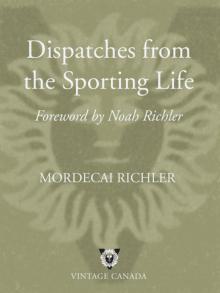 Dispatches From the Sporting Life
Dispatches From the Sporting Life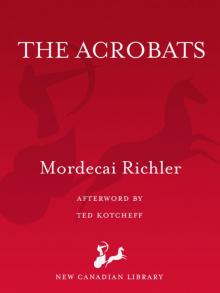 The Acrobats
The Acrobats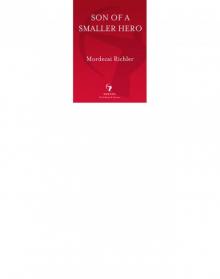 Son of a Smaller Hero
Son of a Smaller Hero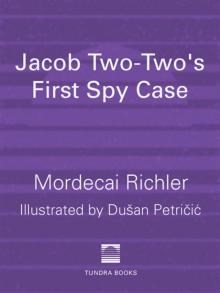 Jacob Two-Two-'S First Spy Case
Jacob Two-Two-'S First Spy Case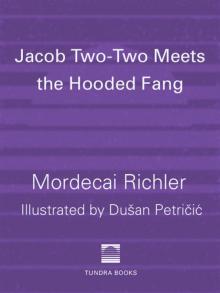 Jacob Two-Two Meets the Hooded Fang
Jacob Two-Two Meets the Hooded Fang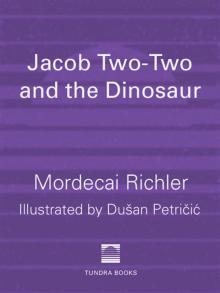 Jacob Two-Two and the Dinosaur
Jacob Two-Two and the Dinosaur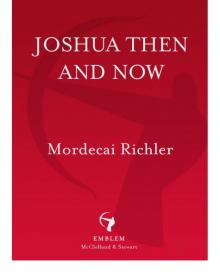 Joshua Then and Now
Joshua Then and Now Solomon Gursky Was Here
Solomon Gursky Was Here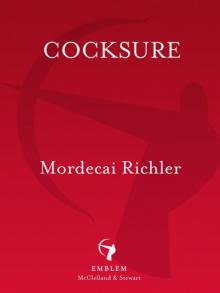 Cocksure
Cocksure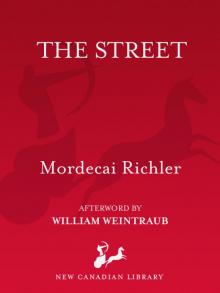 The Street
The Street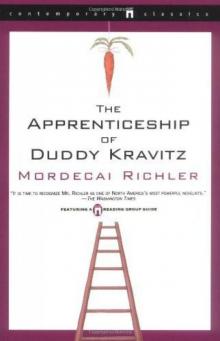 The Apprenticeship of Duddy Kravitz
The Apprenticeship of Duddy Kravitz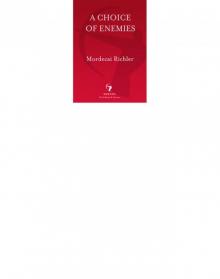 A Choice of Enemies
A Choice of Enemies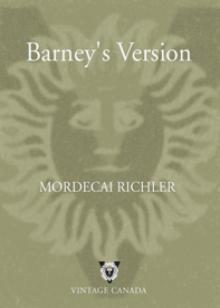 Barney's Version (Movie Tie-In Edition)
Barney's Version (Movie Tie-In Edition)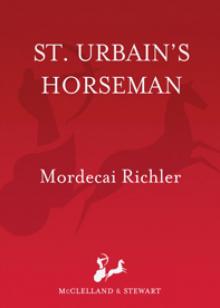 St. Urbain's Horseman
St. Urbain's Horseman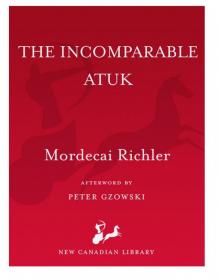 The Incomparable Atuk
The Incomparable Atuk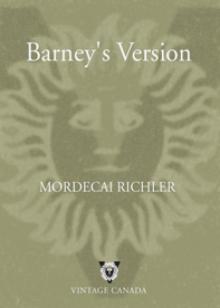 Barney's Version
Barney's Version